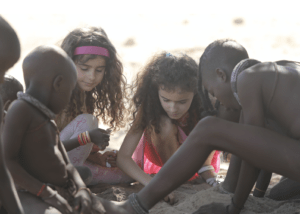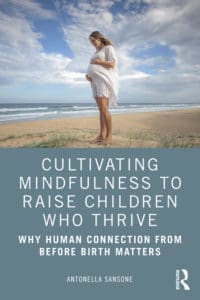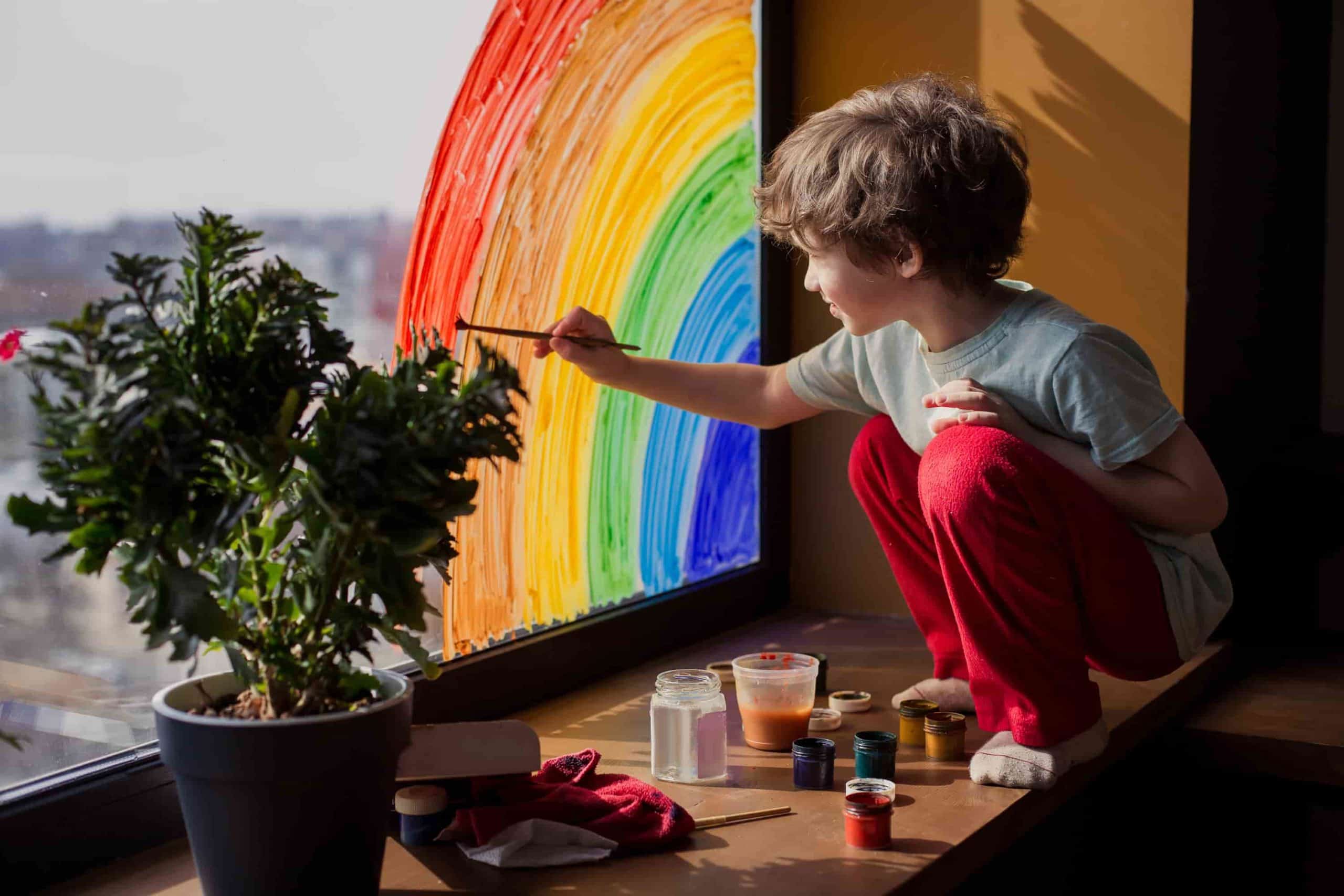Aristotle once said, “Give me a child until he is seven and I will show you the man.”
Sorry parents, I’m not trying to put the pressure on, but it turns out that wise Greek philosopher was onto something 2000 + years ago. Whilst experiences throughout life will also shape who your child becomes, it’s all the crucial milestones and development stages that happen in the first seven years which will set them up for the rest of their lives.
What kind of grown-up do you want your child to be? What kind of life do you want them to lead? Whilst it’s hard considering these things when they haven’t even started eating solids and it seems like we’re getting ahead of ourselves, research has shown how important these younger years are.
I have asked an expert in this area – Dr. Antonella Sansone, author of Cultivating Mindfulness to Raise Children Who Thrive: Why Human Connection from Before Birth Matters – to explain why;
Q. Why are the first years of a child’s life so important to who your children become as an adult?
Antonella: Although the human brain is a social organ and retains its plasticity throughout life, thus can be affected by experience at any stage of life, studies do show that the first years of life are very important in your child development. The brain develops rapidly during the first years of life.
During the first three years of life, a child’s brain is already forming one million neural connections every minute because of exposure to experience, in particular learning from their family and community. A child under 7 has lower brainwaves frequencies (Theta) and consciousness, as recorded by electroencephalograph recording brain activity. Theta refers to brain activity in connection with creativity and imagination, which explains why children learns through play. These early experiences, beginning from life before birth, form our unconscious programming, which controls 95 percent of our adult life experiences (Lipton, 2015). Only five percent is conscious, yet able to modify limiting beliefs that undermine our power and our health.
Although the brain is sensitive to experience throughout life, experiences in the prenatal and early postnatal stages shape to a large extend our biological and psychological make up – medical conditions, immune system, reaction to stress, ability to relate to others, to love and be loved, to cooperate in society and share care, to be empathic and compassionate towards others. It follows that the earliest period of life provides a unique opportunity for the primary prevention of biological, psychological and societal disorders.
Because of the brain plasticity especially in early life, initial prenatal and postnatal conditions matter for developmental trajectories. Early experiences have epigenetic effects on all biological systems, emotional and social behaviour and the development of human virtues such as connectedness, empathy, compassion, listening, intimacy, morality.
What is Epigenetics? At conception we inherit certain genes physiologically, but these genes don’t necessarily get turned on and off or express properly without certain experiences. For instance, if a baby does not receive evolved nurturing practices – smooth birth, constant touch, responsiveness, extended breastfeeding, soothing experiences keeping the baby calm, face-to-face interactions – those genes will never get turned on or never get turned on properly. So multiple neurobiological systems will be dysregulated, affecting the child and future adult’s psychology, spirituality and morality (Darcia Narvaez studies the neurobiology of moral development).
The bond between child and mother, as well as the shared companionship with her mother, father and other caregivers in the community, provides a child with the earliest enjoyment and vital energies. Through the care given to her needs and love (as early as in the womb), the child learns to enjoy, prioritise relationship and perceive it as a source of pleasure, trusting that her needs will be met.
To become a fulfilled human being, a child needs to develop key life skills such as self-esteem, communication skills, and learn how to regulate their emotions, maintain their health and well-being, resilience, kindness, love and be inspired to achieve meaningful things by witnessing caregivers cultivating these abilities themselves.
This learning is not a matter of reasoning — of discipline, punishment, or acting according to abstract rules — but occurs through implicit processes fostered by cooperation, such as mirroring. It is about two human beings being connected. This social and moral learning involves our neurobiological and emotional development early in life (Narvaez, 2014). The right brain stores implicit processes of early life for holistic processing of emotions and social interactions and for affiliative motivations (Schore, 2012).
Children need to learn human values from their parents through the way in which they are treated and cared for, starting from conception and gestation. If they are treated with empathy, compassion, kindness and respect, they become kind and caring human beings. They learn that violence is not acceptable. When children are not scared by punishment, they learn to trust their parents and openly talk with them when difficulties arise. Care-giving practices have long-term effects on psycho-social development in early childhood (Narvaez & Gleason, 2013).
The kind of relationship between the parents also has an important impact on a child’s socio-emotional and moral development. Through their interactions, they provide an internal working model to the child that is stored in the nervous system. In future, the child is likely to develop the same kind of relationships as they witness in their childhood.

Himba Children
Photo Credit: Dave Southwood
davesouthwood.photography
When it comes to children, role modelling is crucial. Parents’ wisdom practice lead to wise moral functioning in children. Capacities for an ethic of love emerge easily from companionate care, where from conception the environment conveys messages “all the way down” that the child is welcome (Emerson, 1996; Lake, 1979; Meany, 2010).
Through presence, reverence and loving manifestations, as early as conception and gestation, parents provide the optimal environment, as the child learns the value of companionship, empathy and compassion. When the pregnant mother is surrounded by meaningful others, the child learns a rich web of relationships from the mother’s feeling of being emotionally supported and from other subtle ways. After birth, through a mindful community supporting parenting, the child expands their knowledge of the value of cooperation and mutual respect, on which a fulfilled working environment and peaceful society are based.
Q. What are the significant milestone developmental stages during these seven years and what does my child need from me at those stages?
Antonella: What is most important for the parents to know for the first eighteen months of an infant’s life and life before birth is to form a close connection, secure attachment and take pleasure in connecting with the baby during pregnancy, caring for, holding, touching, picking up baby’s body cues, talking, playing with, listening and responding, and keeping the baby as close and calm as possible throughout the day and night time.
If the relationship is a source of enjoyment to both the parent and child, all the brain areas, in particular the prefrontal area, will develop properly. When parents spend time interacting with their children, thus are fully present and responsive, it helps to integrate the different parts of their children’s brain, which leads to improved decision-making, better control of body and emotions, fuller self-understanding, stronger relationships and success in school (Siegel, 2011).
As infants become toddlers, reciprocal interactions can also be expressed by playing make-believe games. For children play is a real thing. These interactions tell children that you are paying attention at their experience and engaged with what they are trying to express. This is how children learn social norms, communication skills, and relationships.
Neural connections in the brain are shaped by human connection and from this the mind emerges (Siegel, 1999). Anxiety, depression and stress linked to life stressors or trauma interrupt the flow of interactions or dance of communication. If this occurs occasionally it won’t undermine children’s development and lead to dysfunctional patterns. But having continuous life stressors or daily distractions such as that of smartphones, can prevent you from engaging with your children, picking up their body cues, understand their needs, and responding.
Practising mindfulness;

Antonella’s children playing with the Himba children Photo Credit: Dave Southwood davesouthwood.photography
can help parents become more present and empathic with their children and pay attention to what is going on with them and to their requests for connection. Practising these abilities is so important since these early reciprocal interactions with the primary caregivers and later with meaningful others can affect a child’s attachment style, which impacts how they develop future relationships, including intimacy (Ainsworth, 1969). Attachment style is not only a psychological construct but has a neurobiological history. Because of the rapidly growing brain, the first seven years set the foundation for how children communicate and interact with the world by mirroring how they are being responded to.
Children develop their full potential in a network of nurturing relationships in which school also plays an important role, when, by the time children reach first or second grade, they begin to separate from primary caregivers by making friends of their own. They are also able to talk about their feelings and use metaphor, reflecting an ability to think and reflect upon things. While we cannot control every aspect of our children’s wellbeing, we can help them meet developmental milestones thus build a secure attachment style, which is the foundation of their wellbeing. What we can do is to engage with them as a trustworthy adult to positively impact on their unconscious programming that will lead 95 percent of their life experiences.
Through companionship care, the child learns to be in a common self, first with mother, father and grandparents, then with the larger community members, both human and animal. Studies show that, although having a responsive mother matters, infants nurtured by multiple significant caretakers grow up feeling more secure, empathic, independent, and orientated towards achievement. Studies show that mothers with more social support are more responsive to their babies’ needs, while the babies are also exposed to richer social stimulation, growing up emotionally more responsive, more resilient, learning language sooner and less likely to be neglected by their mothers (Olds et al., 1986; Olds, 2002, 2007). In traditional societies, support from alloparents, which allowed our ancestors to evolve, not only improved health, social maturation and mental development; it was essential for child survival.
Helping children develop kindness, companionship, empathy and compassion seems an obvious good idea, but today these valuable human capacities are left to chance, rather than cultivated, in our educational system, even in parenting. Many families of course instill these values in their children, but many do not. Programmes have been used in schools that encourage four-year-olds to practise mindful attention to focus on their body and feelings while interacting with other kids —particularly if that other child got upset — and to help each other and express gratitude (Flook et al., 2015; Davidson et al., 2012). Getting such programmes into school ensures that all children are given the opportunity to develop heart-based qualities, empathy and kindness alongside the traditional academic skills.
“Kindness, caring and compassion all follow a line of development that our educational system largely ignores—along with attention, self-regulation, empathy, and a capacity for human connection” (Goleman & Davidson, 2017). Neuroplasticity tells us that brain circuitry can be guided through training such as the mindfulness-based Kindness Curriculum (centerhealthyminds.org) just as they can through the parents’ practice and teaching of these human virtues.

Cultivating Mindfulness to Raise Children Who Thrive introduces an expanded view of human development and health, which begins before conception and moves through pregnancy, early childhood and adulthood. Although the brain is sensitive to experience throughout life, experiences in the prenatal and early postnatal stages shapes to a large extend our biological and psychological make up – medical conditions, immune system, reaction to stress, ability to relate to others, to love and be loved, to cooperate in society and share care, to be empathic and compassionate towards others. It follows that the earliest period of life provides a unique opportunity for the primary prevention of biological, psychological and societal disorders.
The book will be of interest to clinicians, policy makers, researchers, parents, and those interested in the prenatal and perinatal roots of human development and well-being. Get your copy today from www.routledge.com





